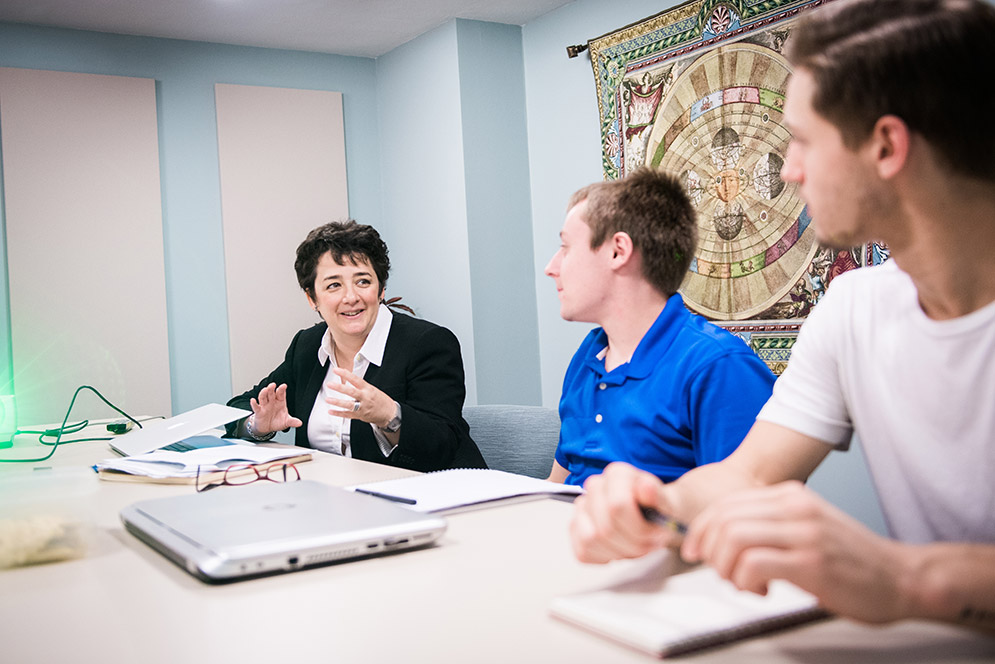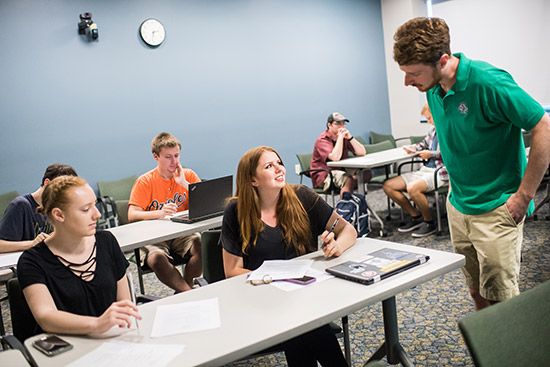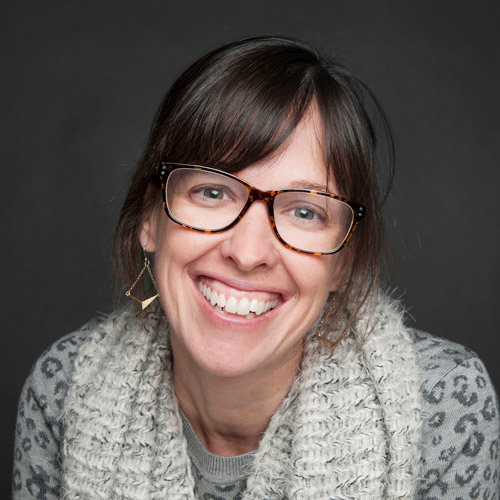NSF Program Brings Budding Astronomers to BU
Students paired with faculty on research projects

BU’s Merav Opher meets with Mark Hubbert and Matt Schuler, students visiting campus through a National Science Foundation program that lets them access University resources in astronomy and space physics.
Many of us thrill to the breathtaking views of outer space permitted by telescopes and spacecraft. But dark matter—the force causing stars to move faster than their mass would allow—poses a pesky problem: you can’t see it. So Carly Snell, aided by the chair of BU’s astronomy department, Tereasa Brainerd, is spending the summer writing computer code to analyze telescopic survey data of the heavens. One goal is to see if the orbits of actual galaxies match those in simulations of dark matter.
Snell doesn’t go to BU; the physics major will be a senior this fall at North Dakota State University, “and my department there does not have astronomy,” she says. The National Science Foundation’s Research Experience for Undergraduates (REU) program provides aspiring astronomers like Snell the opportunity to pursue this research.
This summer—BU’s third participating in REU—has brought Snell and five other undergraduates from different universities to campus to help professors researching topics in astronomy and space physics. The latter get research help; the students have “the opportunity to wet our feet a little bit in research that a lot of people wouldn’t necessarily get at their home university,” Snell says. (BU’s own students get similar mentoring through the University’s Undergraduate Research Opportunities Program.)
The REU program in the astronomical sciences includes 28 universities, observatories, museums, and other institutions, including BU. Here, the students enrolled in this summer’s program hail from the Universities of Kansas, Maryland, Michigan, North Dakota State, Rochester, and Wisconsin. They spend 10 weeks on campus, studying topics “from the earth to the galaxies,” says Merav Opher, a College of Arts & Sciences associate professor of astronomy and director of BU’s REU program.
Each student is matched with a specific research project so that they can work closely with specific researchers. Students receive a stipend as well as financial support for food, lodging, and airfare.

Mark Hubbert, a rising senior at the University of Maryland, is helping Opher’s effort to confirm her new model of the shape of the sun’s magnetic field, the heliosphere. “The model is pretty rock-solid from a theoretical perspective,” he says, “but hasn’t really been substantiated from an observational perspective.” So he’s using various software programs to compare the model’s predictions with observed properties.
“Dr. Opher is a huge name in the field of heliophysics,” Hubbert says of his interest in coming to BU. “The resources—human and equipment—here are great, and I know that whatever I put my hands on has the potential to be a new and innovative discovery.”
He says that another benefit of the REU program is its mentoring style, which “makes the students in the program feel like their work is important and appreciated. This, unfortunately, is not something that every program puts focus on when bringing in summer interns.” Working at NASA’s Goddard Space Center last summer, he says, “the sheer magnitude of the operation made it very easy . . . to get lost in the fray. Here, I knew that the environment would be more intimate.”
In addition to their individual research, the students gather Wednesdays for discussions, either about specific topics in astronomy or graduate study and career opportunities in the discipline, says Marc Kornbleuth (CAS’13,’16, GRS’20), a research fellow with Opher who runs the weekly discussions.
REU is “a great exposure for the [astronomy] department,” says Opher. “These students come out from here; they’ll tell their advisers [at their universities] how great a program it was.” As an example, Kornbleuth cites one REU participant from two years ago who is returning to campus this fall for graduate study.
The good news for students thinking of applying to the program is that you don’t necessarily have to be an astronomy or physics prodigy to participate. Opher recalls one student she unsuccessfully tried to recruit who “had a really strong background in arts” but was interested in exploring astronomy. “And I thought this would be a very interesting combination.”


Comments & Discussion
Boston University moderates comments to facilitate an informed, substantive, civil conversation. Abusive, profane, self-promotional, misleading, incoherent or off-topic comments will be rejected. Moderators are staffed during regular business hours (EST) and can only accept comments written in English. Statistics or facts must include a citation or a link to the citation.